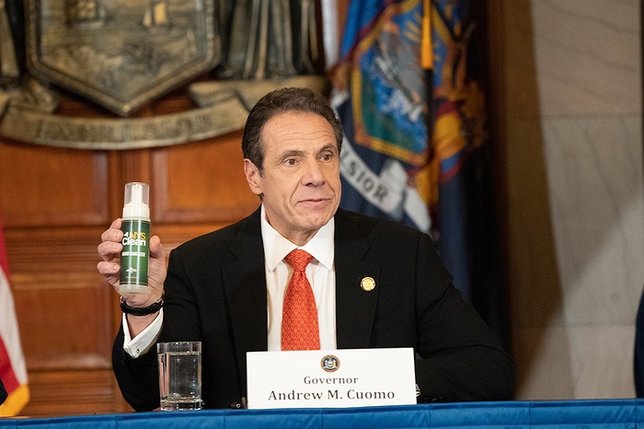During a novel coronavirus briefing, Governor Andrew M. Cuomo today announced the state will provide alcohol-based hand sanitizer to New Yorkers free of charge. To help combat price-gouging and ensure New Yorkers have access to this vital prevention method, the state will produce up to 100,000 gallons of hand sanitizer each week in 1.7 oz., 7 oz. and gallon bottles. The hand sanitizer will be made available to residents free of charge, and distribution will be prioritized by the most impacted and high risk communities, including the New Rochelle community, and state agencies, including the MTA.
Governor Cuomo also confirmed 37 additional cases of novel coronavirus in New York State since his last update from Sunday, bringing the statewide total to 142 confirmed cases.
The Governor also announced the New York State Department of Health will work with the New York State Education Department to issue guidance for schools with students, teachers or other staff who test positive for novel coronavirus. Under the policy, schools will close for an initial 24-hour period if a student or a teacher or any other staff at the school test positive for the novel coronavirus. This will allow the school to undergo disinfection, and for the State to perform an assessment of the situation and make a determination going forward in that particular school district.
Additionally, the Governor will send a program bill to the legislature today to provide paid sick leave to working New Yorkers and specifically protect those who are required to stay home from work because they are being isolated or quarantined as a result of the novel coronavirus.
“As the number of confirmed cases of the coronavirus continues to rise, unscrupulous retailers are exploiting New Yorkers’ anxieties about the virus and charging exorbitant prices for hand sanitizer and other similar products,” Governor Cuomo said. “To solve this problem, the state is producing and deploying hand sanitizer to high impact areas as well as schools, the MTA and other government agencies because you can’t get it on the market and the product that is available is very expensive. The biggest problem we have in this situation is fear, not the virus itself, and I’m once again reminding everyone to focus on the facts because the facts do not warrant the level of anxiety we are seeing.”
Of the 142 total individuals in New York State who tested positive for the virus, the geographic breakdown is as follows:
- Westchester: 98 (16 new cases)
- New York City: 19 (7 new cases)
- Nassau: 17 (12 new cases)
- Rockland: 4 (2 new cases)
- Saratoga: 2
- Suffolk: 1
- Ulster: 1
DOCCS, through its correctional industries entity known as Corcraft, will produce an alcohol-based formula recognized by the World Health Organization and has begun production at Great Meadow Correctional Facility in Comstock, Washington County, this week. Through this ongoing effort, the Department will be able to produce up to 100,000 gallons of hand sanitizer per week. Corcraft, which produces dozens of products, uses the manufacturing process to assist in the department’s overall mission to prepare offenders for release through skill development, work ethic, respect and responsibility.
Local governments seeking to obtain additional stocks of hand sanitizer should work with their County’s Emergency Manager and local Health Department to submit requests directly into NY Responds, the state’s web-based system which enables both local governments and state agencies to submit and share vital emergency-related information and resource requests.
Reportedly, some retailers are charging approximately 10 times what major retailers charge for hand sanitizer. On eBay a pack of five 2.5-ounce Germ-X hand sanitizer bottles were selling for $500 – by comparison, two 30-ounce bottles of Germ-X were offered online by Walmart for less than $8.
The Department of Corrections and Community Supervision also began a new screening protocol for COVID-19 for visitors to each of the State’s 52 correctional facilities to help avoid the introduction of COVID-19 into the Department’s facilities. Upon arrival to the facility, visitors will be asked a series of questions regarding any illness or symptoms they may be currently experiencing; travel outside of the United States within the past four weeks, including that of family members; and any direct exposure to an individual diagnosed with the novel coronavirus in the past four weeks.
DOCCS Acting Commissioner Anthony J. Annucci said, “Between increased demand and the price gouging currently taking place in the market, there is a very real need for hand sanitizer for New York residents. DOCCS is proud to meet the Governor’s call to action and do our part in stemming the spread of COVID-19 across the state.”
Last night, the Governor announced that Northwell Laboratories has been authorized to test under Wadsworth’s emergency use authorization. Manual testing of 75 to 80 samples per day has begun at Northwell, but automated testing still needs to be approved by the federal administration so the lab can perform thousands of tests per day. Additionally, NY Presbyterian Hospital is ready to start running 50 to 60 tests daily once it receives federal approval for testing. The Governor again today urged the federal administration to approve the use of the state’s coronavirus test by private labs, such as NY Presbyterian.
Prevention tips from the New York State Department of Health:
While there is currently no vaccine to prevent this virus, these simple steps can help stop the spread of this and other respiratory viruses:
- Wash your hands often with soap and water for at least 20 seconds. If soap and water are not available, use an alcohol-based hand sanitizer.
- Avoid touching your eyes, nose and mouth with unwashed hands.
- Avoid close contact with people who are sick.
- Stay home when you are sick.
- Cover your cough or sneeze with a tissue, then throw the tissue in the trash.
- Clean and disinfect frequently touched objects and surfaces.
The Department of Health has additional information on COVID-19: https://www.health.ny.gov/diseases/communicable/coronavirus










